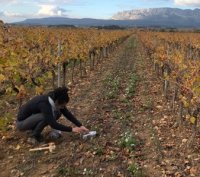Research topic :
Testing new agricultural practices for vineyards : Effects on plant-soil continuum
Thesis supervisors : Anne Marie Farnet da Silva (IMBE), Isabelle Laffont-Schwob (LPED)
Viticulture the Mediterranean has a great economically and cultural importance. However, extreme weather events (such as drought and increasing temperature) and intensive techniques (such as tillage and the use of pesticides) pose a large threat for viticulture future. This thesis is part of a research project aimed to the development of new practices agriculture respectful of human health, of the biodiversity of vineyards at the base of the sustainability of the functioning of these environments, based on a circular economy and associating the actors with the changes in practices (ALCOVE program funded by the Mediterranean Institute for Transition Environmentale, AMidex AMX-19-IET-012). In this context, the aims of this PhD thesis is to evaluate the effects of different sustainable agricultural practices in viticulture on the soil-plant continuum by : (i)Optimizing the formulation of biocontrol products (BCPs) using solid-state fermentation of T. asperellum. (ii) Evaluating the optimized BCPs and fermented forest litter (FFL) on the soil and the vine under semi-controlled conditions (iii) Evaluating the effects of different agricultural practices (organic massive amendment, grass cover and irrigation) on vineyard soil and the vines at field level (in collaboration with the Association des Viticulteurs de la Sainte Victoire). Physico-chemical (Infrared spectroscopy signature, bioavailable copper, pH, conductivity, texture) and microbial (respiration, catabolic diversity, biomass) parameters of soils were analysed as well as the description of phytometabolites for both fruits and leaves using both multiplex Force A and infrared spectroscopy. Preliminary results of the field experiment show the benefit of massive organic matter amendment and grass cover on soil microbial indicators especially during the drought period.
Key words:viticulture , sustainable agriculture, plant physiology, soil health.





